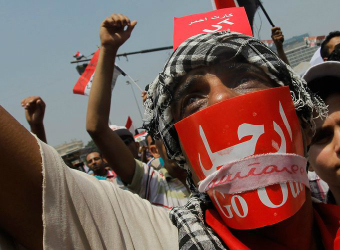It may be one of the most remarkable political rants ever caught on television. On the day before Egypt’s coup, opposition activist Ehab al-Khouli launched into a vociferous diatribe when asked about Mohamed Morsi’s last public speech as president.
“This ‘former’ president is addicted to his throne,” he screamed, gesturing wildly. “This man is a liar and a deceiver.” He gasped for breath and doubled over, coughing, as the talk show host pleaded with him to calm down. But he continued — beating the table, jumping out of his chair — for nearly four minutes.
Al-Khouli, in rather stark form, captured the anger and frustration of the millions of Egyptians who took to the streets on June 30. For many, democracy was not simply a matter of faith, or even of principle, but a means to something else: a sense of dignity, the promise of economic benefit, or the freedom to dress and think as they wish. Their sense that democracy had failed to bring real gains set in motion the breakdown of political order, the return of the generals and the overthrow of Egypt’s first democratically elected president.
The problem with coups is that, far from resolving conflicts, they threaten to exacerbate them. Soon after Morsi was ousted, the Egyptian military shut down several Islamist television stations andordered the arrests of hundreds of Muslim Brotherhood members. The repression escalated this past week, with soldiersgunning down more than 50 Morsi supporters and the new military-appointed president issuing a constitutional decreegranting himself nearly unlimited power.
Although a six-month timeline has been set for elections, these events paint a dark picture of what’s to come. With the country divided over the legitimacy of its leaders, repression is almost inevitable as a way to enforce the new order.
There is little doubt that Morsi was an incredibly disappointing president, narrow in vision and incompetent in execution. He should have realized that the greatest threat to a young democracy comes from those who believe they have no stake in the political system. These are the spoilers and they must be brought in. This requires magnanimity. Even if you are “right” — even if you win five successive elections, as the Muslim Brotherhood did — you can, and should, offer more concessions. And, to the extent possible, you should mean it.
Yet, under Morsi, a political process was in place that at least allowed the opposition to challenge his decisions, win a plurality in parliamentary elections and perhaps even form a government. In other words, there was the possibility of change from within the system.
Whether that possibility exists today is very much in doubt. One part of the country considers Adly Mansour the legitimate head of state while another considers Morsi the rightful president. The coup and subsequent crackdown have pushed millions of Morsi supporters outside the political order. It will be difficult for them to participate in a process they do not acknowledge. Yes, democracy is more than the ballot box. But the turmoil in Egypt underlines the importance of taking elections more seriously as the foundation of a democratic order.
If all it takes are massive crowds in the streets to bring down an elected leader, the very notion of democratic legitimacy will find itself under attack by a permanent revolution of sorts. As one Morsi partisan reasoned just a day before the coup, “It’s fine. If [Morsi] goes down, we’ll bring down the president they elect.”
This is in a way its own crude form of democracy, with voting booths replaced by city squares and wide boulevards, and the act of counting votes replaced by the sheer mass of bodies. Political competition is reduced to a war of crowds and, inevitably, inflated protest counts. The 33 million cited by anti-Morsi protesters is not just a product of over-exuberance and a lack of spatial perception, but represents a pure, unmediated populism that appropriates “the people,” and their will, for ultimately divisive ends.
The case for procedural democracy may sound boring and staid. It is not the stuff of political fashion. I remember seeing my Egyptian and Tunisian friends voting for the first time in 2011, showing off stained index fingers. It felt good, but it could not compare to the rush of revolt. It was perhaps the historian Eric Hobsbawm who captured the feeling most colorfully. “Next to sex,” he wrote in his 2002 autobiography, “the activity combining bodily experience and intense emotion to the highest degree is the participation in a mass demonstration at a time of great public exaltation.”
There is little glamour to be had in following electoral procedures, building political parties and organizing voters who may have lost faith in politicians. But all of these things are essential, and without them there is no real way to practice politics.
If and when Egypt has another round of free, fair and inclusive elections, the outcome will need to be respected rather than discarded as it was in the five successive polls over the course of 2011 and 2012. Democracy, at its very essence, is not about winning — anyone can do that — but learning how to lose.
About the Writer:
Shadi Hamid is director of research at the Brookings Doha Center and a fellow at the Saban Center for Middle East olicy at the Brookings Institution.
Source: The Washington Post


